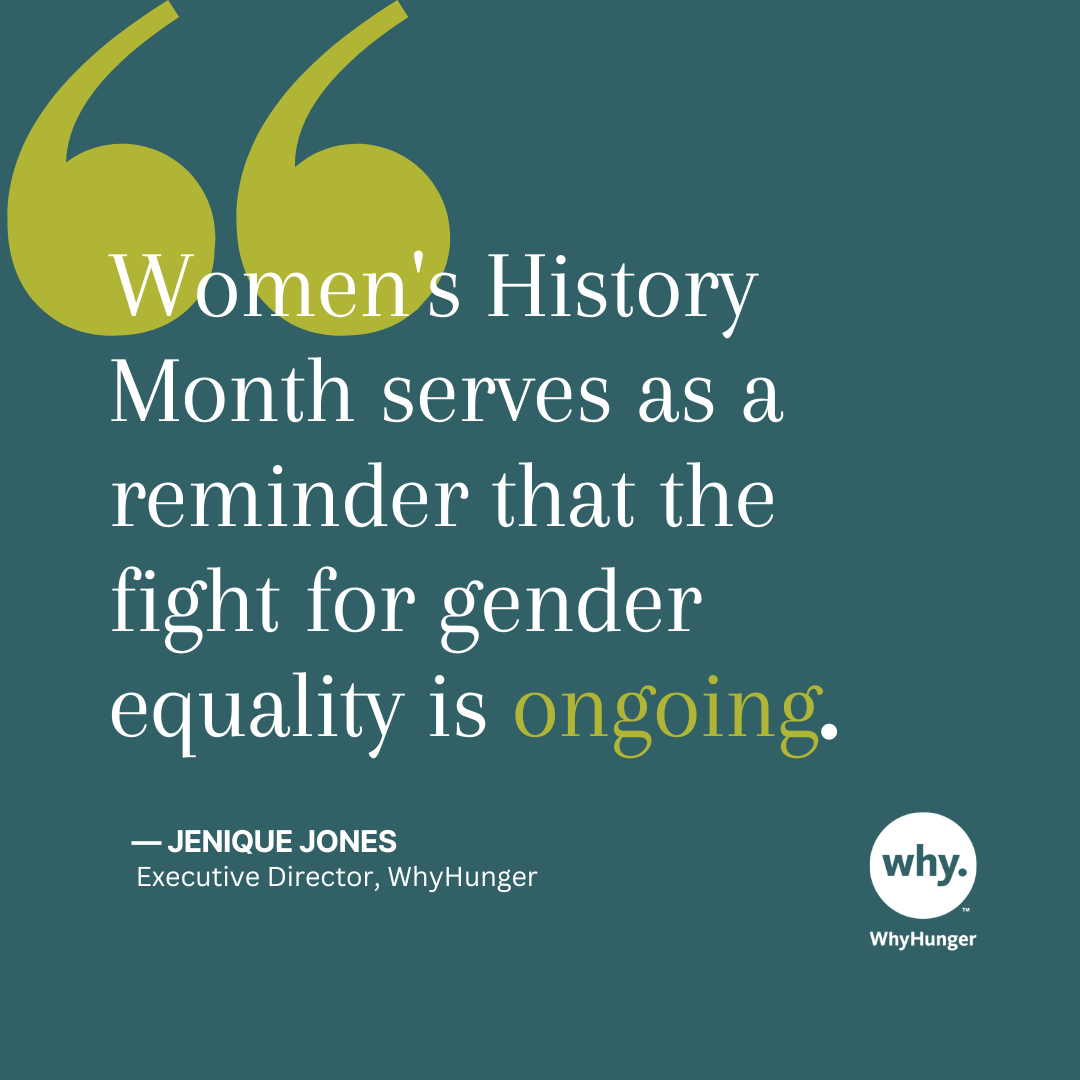Dear WhyHunger Community,
As we celebrate Women’s History Month, it is crucial to shed light on the ongoing struggle for pay equity!
Pay equity is not merely a women’s issue; it is a societal concern that demands our attention and collective action. The statistics are stark. According to recent data, women, on average, earn about 77 cents globally and 82 cents in the U.S. for every dollar earned by men. However, when we break down the U.S. figure by race and gender identity, a more complex and troubling picture emerges. African American women earn approximately 63 cents, Indigenous women earn 60 cents and Latina women earn a mere 55 cents for every dollar earned by white men. A recent study by the Human Rights Campaign found that trans women earn just 60 cents and non-binary folks earn 70 cents per dollar compared to the average American worker.
To further emphasize the impact of these disparities, let us consider the time it would take for each group of women in the U.S. to earn what their male counterparts make in a year. On average, it takes a woman 15 months to earn what a man makes in 12 months. For African American women, it takes 19 months, Indigenous women 18 months, and Latina women 22 months.
These discrepancies are not arbitrary; they reflect systemic issues deeply rooted in our society. Factors such as occupational segregation, lack of representation in leadership roles, and biased hiring and promotion practices contribute to the wage gap. It is crucial to acknowledge that the fight for pay equity is intrinsically linked to dismantling racial inequalities within the workplace.
Moreover, the impact of pay inequity transcends the workplace, fueling the economic injustice at the root of poverty and food insecurity, particularly for women. Globally, women face an increased risk of poverty and are far more likely to struggle with meeting basic needs, including access to sufficient and nutritious food. Yet at the same time, women are responsible for 60-80% of food production in the Global South and represent 50% of food chain workers in the U.S.
According to the data, something as straightforward as simply closing the gender pay gap would significantly reduce the poverty rate for women and their families. When women are paid equitably, they are better positioned to provide for themselves and their loved ones, contributing to overall community well-being.
According to the organization Higher Heights for America, which advocates for harnessing the power of Black women and expanding our elected representation, if a woman is paid equitably, she could buy:
- More than 2.5 years of childcare.
- More than 2.5 additional years of tuition and fees for a four-year university, or the full cost of tuition and fees for a two-year community college.
- Nearly 16 additional months of premiums for employer-based health insurance.
- More than 3 more years of food for their families.
- 15 additional months of mortgage and utilities payments.
These examples highlight why advocating for legislative changes that address pay equity and eradicate discriminatory practices is paramount. Supporting initiatives like the Paycheck Fairness Act and other policies aimed at closing the wage gap is a tangible step toward building a more equitable future. Addressing these challenges requires organizations to actively engage in transparent pay practices, conduct regular pay equity audits, and implement policies that promote inclusivity and diversity. As the leader of WhyHunger, I am committed to fostering an environment that champions equity and actively works towards eliminating disparities in all forms. Through our collective efforts, we can create a future where pay equity is not just an aspiration but a reality, positively impacting the lives of women and their communities, and fostering a society built on fairness and justice.
Women’s History Month serves as a reminder that the fight for gender equality is ongoing. By recognizing the additional challenges faced by women, particularly women of color in achieving pay equity, we take a crucial step toward building a fairer, more inclusive world. As we celebrate the achievements of women throughout history, let us also acknowledge the work that still lies ahead in ensuring that every woman, regardless of her race, receives the compensation she deserves. In the words of Glynda Carr, President and CEO of Higher Heights for America, “pay us our whole dollar!”
Peace, Jenique
P.S. You can learn how women around the globe are confronting these inequities head on and are creating just, sustainable communities that benefit all in WhyHunger’s Through Her Eyes: The Struggle for Food Sovereignty.



